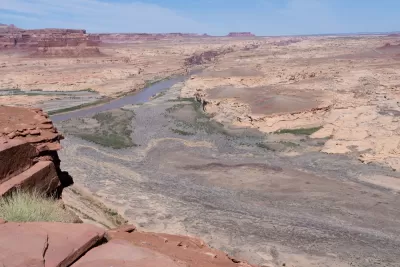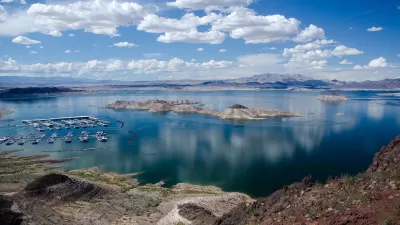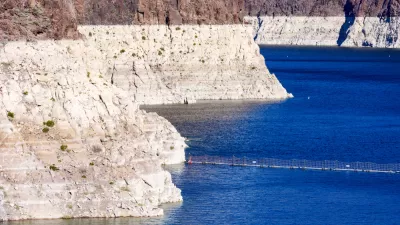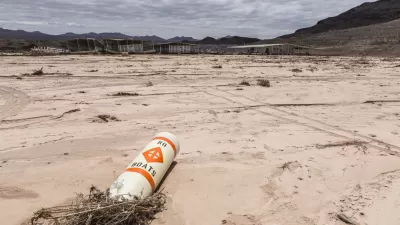A water buyback program will pay farmers who reduce their water use in an effort to sustain the West’s reservoirs, which are at historically low levels.

The federal government has directed part of a $4 billion investment in drought mitigation on the Colorado River to efficiency upgrades in the four Upper Basin states as well as direct payments to farmers who reduce water use. “Both programs join the raft of multi-state agreements and emergency conservation measures that appear designed to stave off catastrophe before 2026,” writes Alex Hager for KUNC.
The program, which encourages farmers to forgo water deliveries and leave more water in the river’s rapidly shrinking reservoirs, “will pay $330 per acre-foot for a one-year agreement with a grower, $365 per acre-foot for two years, and $400 for a three year commitment.” According to Hager, “Reclamation previously tested system conservation efforts in a pilot program that ran from 2014 to 2019 in which farmers were paid to forgo some water. Wednesday’s announcement marks the first return to large-scale water buybacks since.”
Some farmers say the pricing is not sufficiently high to convince farmers to participate. “A group of farmers near Yuma recently proposed a water conservation plan in which they would be paid about $1500 per acre-foot of water saved, according to Axios.”
More on Planetizen:
FULL STORY: Feds are putting a price tag on water in the Colorado River basin to spur farmers to conserve

Study: Maui’s Plan to Convert Vacation Rentals to Long-Term Housing Could Cause Nearly $1 Billion Economic Loss
The plan would reduce visitor accommodation by 25,% resulting in 1,900 jobs lost.

Alabama: Trump Terminates Settlements for Black Communities Harmed By Raw Sewage
Trump deemed the landmark civil rights agreement “illegal DEI and environmental justice policy.”

Why Should We Subsidize Public Transportation?
Many public transit agencies face financial stress due to rising costs, declining fare revenue, and declining subsidies. Transit advocates must provide a strong business case for increasing public transit funding.

Paris Bike Boom Leads to Steep Drop in Air Pollution
The French city’s air quality has improved dramatically in the past 20 years, coinciding with a growth in cycling.

Why Housing Costs More to Build in California Than in Texas
Hard costs like labor and materials combined with ‘soft’ costs such as permitting make building in the San Francisco Bay Area almost three times as costly as in Texas cities.

San Diego County Sees a Rise in Urban Coyotes
San Diego County experiences a rise in urban coyotes, as sightings become prevalent throughout its urban neighbourhoods and surrounding areas.
Urban Design for Planners 1: Software Tools
This six-course series explores essential urban design concepts using open source software and equips planners with the tools they need to participate fully in the urban design process.
Planning for Universal Design
Learn the tools for implementing Universal Design in planning regulations.
Smith Gee Studio
Alamo Area Metropolitan Planning Organization
City of Santa Clarita
Institute for Housing and Urban Development Studies (IHS)
City of Grandview
Harvard GSD Executive Education
Toledo-Lucas County Plan Commissions
Salt Lake City
NYU Wagner Graduate School of Public Service





























